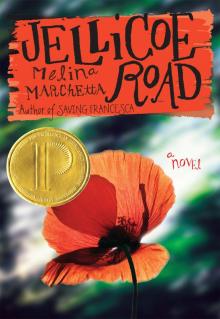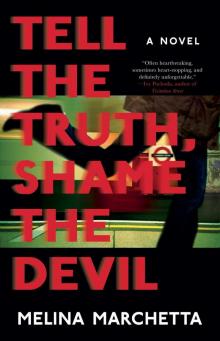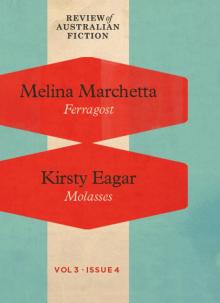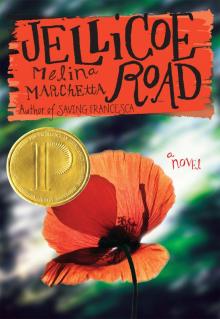- Home
- Melina Marchetta
The Piper's Son Page 3
The Piper's Son Read online
Page 3
Tom swallows hard. His pop Bill had mentioned something about Tom Finch a month ago, when they last spoke.
“Is it true what they’re saying? About finding Tom Finch’s body soon?” he asked.
Her eyes bore into his.
“Where did you hear that?”
“Saw it on the news. How those old-timer vets found two of the others guys back in June. They reckon it’ll be Tom Finch soon.”
She’s still looking at him, scapular gripped in her hand. He can tell. This is the beginning of the ritual. Georgie’s preparing to bury her father after forty years. Tom can’t imagine what that’s going to do to his family.
Not after Joe.
“Pop Bill sounds choked up every time he brings it up.”
“They were best friends, Bill and Tom Finch,” she says. “Knew each other all their lives.”
And they both fell in love with Nanni Grace.
“Do you think it’s true,” he asks, “about the scapular?”
She shrugs. “Don’t know. But when we were kids, Dominic wouldn’t go anywhere without it. It’s like he thought if he was wearing it, maybe Tom Finch would find us somehow.”
He sighs, standing up. There are too many subjects he wants to avoid. “Thanks for the sheets and stuff.”
There’s a soft smile on her face. “When I walked into the attic, it was the first time I didn’t think of it being Joe’s room,” she says. “I thought of those gorgeous girls you used to hang out with in high school and at uni. What was the name of the one whose mother worked at the Red Cross before me? She stayed here one night and you both looked . . . I don’t know . . . frisky.”
“Tara,” he says, his voice husky. “She’s in Timor.”
Tara Finke, whose voice was suddenly stuck in his head, “Talk to me, Thomas. Just talk to me.” If he was going to dream up any words from her, they’d be angry ones, not ones said with such empathy.
“Do you want me to make you something to eat?” she asks.
He nods. He doesn’t know whether it’s the food or the normalcy of it all, but he follows her down and watches as she tosses some veggies and chicken around in a wok. They eat in silence, but it’s a better silence than he’s used to, and then he goes to bed and he lies there studying the photos he carries around. One belongs to him and the other two belong to his father, but Dominic Mackee left them behind like he left everything behind when he nicked off. Tom’s favorite is of Nanni Grace’s four men, as she’d like to call them. Tom with Joe, Pop Bill, and Dominic. He remembered that day when his nan took the photo just as Joe’s tongue snaked into Dominic’s ear. “Oh, you’re a silly boy, Joseph Mackee,” she had said with a laugh. And then there’s the one of Tara and the girls with Jimmy Hailler and Tom, back when they were in Year Twelve. Tara had her hand up over her eyes, trying to block the sun, while Tom’s arm was around her shoulder. It was one of those photos taken under the instruction that they had to huddle up to fit in the frame. He remembers keeping his arm there for ages after. The last is of Joe and his girlfriend standing on Solsbury Hill in Somerset back in 2005. Peter Gabriel’s “Solsbury Hill” was Tom’s father’s favorite song, so Joe sent him the next best thing.
And in his dreams that night, it’s not just Tara Finke’s voice he hears but Joe’s. So clear. As if they had both just spoken to him the day before. And he wants to stay asleep so he can hear their voices for as long as he can.
“Georgie?” She hears Lucia’s voice as she balances the phone and tries to find the keys to the front door. “We’re in Norton Street. Are you coming down?”
It’s not really a request; it’s a Lucia order. It’s what she specializes in. She has bullying down to perfection. Lucia’s the one that Georgie gets to ring up and complain to if she’s having a problem with a telco or insurance company. Lucia handles the Charbel household of three kids under eight while still doing conveyancing for family and friends. She volunteers for the Saint Michael’s Parents and Friends group, the tuckshop, writes articles for the Law Society, and still seems to have more energy than all of them. On the day of the bombing, when they received word that Joe was on the Piccadilly line between Kings Cross Station and Russell Square at 8:50 a.m., it was Lucia who spoke on behalf of the family outside Georgie’s house. The rest of them could hardly speak. When the press refused to go away, she was the one who shouted, “Can you please respect this family’s privacy, you fuckers!” while shoving between the vultures with her pram. They all used to snicker at the people who made scenes on the six p.m. news. Until someone decided to stick a camera and microphone in front of their dead brother’s father and ask Bill how he was feeling.
“Abe and I have a babysitter,” Georgie hears her say, and she can hear Abe in the background organizing everyone. “You know how rare that is.”
Georgie doesn’t budge from where she’s standing at her front door. “I’m not up to company,” she says. All she has to do is put the key in the lock and she’s home free.
“Come on, Georgie. Jonesy reckons he can hardly remember what you look like.”
“Probably because he’s looking down and text messaging every time I see him,” she says tiredly.
“A little antipasto dish and bread sticks and you’ll be home by seven thirty — I promise. Everyone’s here but you.”
Not everyone. Jacinta’s up north and Dominic’s down south.
“Is Sam going to be there?” Georgie asks.
“Yes.”
Silence.
“Georgie,” Lucia says patiently after a couple of moments. “Despite the fact that we’re not talking about your obvious weight gain, can I be blunt in saying that if you and Sam can exchange bodily fluids, then the rest of us can enjoy both of your company together?”
There’s a standoff. The win/loss ratio has always ended with Lucia slightly ahead. One moment’s hesitation costs Georgie.
“We’re at Scalia’s.”
Sam is smoking his lungs out beyond the glass door of the café, which looks out onto the street, while Lucia and Abe are talking kids’ birthday parties and a dwindling social life. Abe belonged to Georgie and her brother Dominic first. They met at sixteen at an Antioch religious retreat. Abe loves telling the story. How he was the good boy who had never broken a rule in his life until Dominic Mackee offered him a cigarette and said, “How about we nick off tonight? My sister’s coming, too.” Abe said it was as though Dominic was promising him a better life if he followed, and about ten years later Dominic made good on that promise and introduced Abe to Lucia. Then Lucia brought Sam along because they worked together at a law firm and were united by what they called death by conveying. Dominic and Sam hit it off in an instant and Georgie ran after Sam for a year before he finally figured out how he felt. They spent the next seven years together until Georgie called a break and then things fell well and truly apart and everyone got caught up in the ricochet.
“Four parties in one weekend”— Lucia’s counting with her fingers —“McDonald’s, bowling, Jamberoo, and a disco party.” Lucia’s sister Bernadette joins them, squeezing between Georgie and Jonesy. Jonesy’s the baby of the group, who’s taught with Abe for a couple of years.
“So we said to Daniel, ‘Honey, no clowns, no jumping castles, nothing. Just good-old-fashioned pin-the-tail-on-the-donkey and a piñata, and for the sake of equality, we’ll invite the whole class.’ Very simple,” Abe explains. Abe and Lucia are always a tag team in the way they tell a story.
“But then all these parents, who haven’t been to a backyard party since they were six years old themselves, decided to turn up with the whole family. So we had ninety people at my son’s birthday and no one wanted to go home. We ended up having to feed them.”
“It was like the loaves and fishes,” Abe said.
“No, the wedding feast at Cana, because we had to give them booze.”
Abe and Lucia’s daughter is going to communion classes and they can quote every parable in the Bible these days.
“An
d Lucia forced me to be in charge of the piñata line,” Jonesy complains.
“He handed out detentions,” Lucia says.
Georgie laughs. “Jonesy, you’re a dick.”
“Next time, you do it, Georgie. Nothing scares me more than a bunch of kids beating up a goat full of lollies.”
“It’s about downgrading,” Abe explains to whoever is listening. “I’ve told the kids there’ll be no Christmas presents this year. We’re donating to an orphanage in Sierra Leone and buying a goat from Oxfam.”
“Lovely,” Georgie says as Abe leaves and joins Sam outside.
When he’s out of listening distance, Georgie and Bernadette send Lucia a look of disbelief.
“Let him think he’s saving the world with that goat,” Lucia says.
Jonesy looks at everyone’s empty glasses and starts working out the round. “You want a beer, Georgie?” he asks.
“No,” Lucia answers for her. “She’ll have mineral water.”
A look passes among them all.
Jonesy taps at the window to find out if Sam and Abe want another beer, and Georgie continues to stare at Lucia. With none of the men around, everything is just about to get more complicated.
“You can’t have pâté either,” Lucia tells her as Georgie digs her water cracker into the mini feast before them.
“And why is that?”
Lucia doesn’t respond.
Just ask me. Just say the words.
“Because it doesn’t taste nice,” Lucia says, taking the biscuit out of her hand as if Georgie is her six-year-old son whose mouth she’s about to clear of whatever object he’s just put in there.
Georgie looks through the glass doors and her eyes meet Sam’s as she tries to ignore the scrutiny she’s receiving from Lucia. It’s why she loves hiding in her house. Because she doesn’t get to see that look in people’s eyes.
She stands just as Jonesy returns with the drinks.
“I’m going,” she manages to say.
Jonesy looks from one to the other. “Ah, come on, G. Sit down. You just got here.”
She shakes her head and she wants to cry because these days it’s too hard not to.
Her eyes meet Sam’s through the glass door again and she sees him sigh, the way his body slumps as he stubs out a cigarette, and next minute he’s poking his head through the doorway. All these years and he hasn’t forgotten the SOS plea in her eye.
“I’ve got to pick up the boy,” he says.
And there they are. Her options. Sitting among friends who don’t know what to say to her anymore. Or picking up a six-year-old who represents the greatest betrayal of her life.
She walks alongside Sam as they make their way up Norton Street. Years ago it’s what they used to do during the week at this time of the night. Come down for a coffee or a quick pasta and glass of wine. They loved it here on weekdays because it belonged to the locals. All the people they wanted in their lives lived within a ten-minute radius. Her brother Dominic had started the vow of not moving away from each other just because they’d be able to afford bigger houses in the outer suburbs. “Let’s stick together, no matter how poky our houses are,” he had made them all promise. “Better to be able to pick up each other’s kids and hang out together than have bigger backyards and rumpus rooms.”
Outside Sam’s mother’s house on Crystal Street, the kid waves up at her like he does every time they do this.
“Hi, Georgie.”
“Hi.”
Sam’s mother watches from the patio of her tiny semi, and Georgie has no choice but to walk toward her. The older woman kisses her, clutching her tightly, as confused as everyone is, and Georgie hears her whisper, “It’s a miracle, Georgie. It’s a miracle.” Which is strange because Sam grew up with people who didn’t believe in anything. And she thinks of those times she’d joke with Lucia and Jacinta and Bernadette that she was the only one of the four who wasn’t named after someone who saw an apparition of the Virgin Mary. Georgie didn’t believe in miracles. It was as though God had said she didn’t deserve them.
They walk toward Stanmore with Sam between her and Callum. As always. As he would when he waited for her at the station in those numb days. The boy was four when Joe died and didn’t question who Georgie was or why she was so silent. She remembered once, when they stood at the lights and Sam’s phone rang and it was time to cross, how the kid took hold of her hand as if she was the only person who could get him to the other side alive. And Georgie felt eleven years old again, holding her little brother’s hand.
When they reach Sam’s house, on Myrtle Street, he unlocks the door and sends Callum in.
“Why don’t you stay?” he asks quietly.
She shakes her head. They have a strange silent agreement. Georgie being under the same roof with Callum isn’t part of it.
“Don’t let Lucia stay upset at you for too long.”
“How do you know it’s not me upset with her?” she asks sharply.
“Either way, it will cut you up. You know that.”
He knows her well. He had slept beside her often enough to know that Georgie needed to be connected to her world. Years ago he’d reach over and grab the phone and hold it out to her. “Ring them and sort this out, or I don’t get to sleep,” he’d snap.
But this is now. He doesn’t say anything. They neither greet nor bid farewell with a kiss or a touch. Their physical relationship only happens in bed. So the unspoken lingers between them. He’s a stranger, this man, with his vulnerability and his empathy. She liked him better with the arrogance. She could fight that with sharp tools of her own.
“They’re hurt,” he says.
“Sorry?”
He sighs. Everyone sighs in front of Georgie these days.
“They’re hurt that you haven’t told them about the baby.”
“Why can’t they just ask?” she asks bluntly.
“It’s not their business to. It’s yours to tell and they can’t understand why you won’t.”
She sees it on his face, the recognition of her shame.
Because you don’t get pregnant by a man who’s betrayed you and boast about it to the world. Because you don’t forgive his relationship with another woman, no matter how nonexistent or brief it was. This is shame, she wants to shout at him. Not getting pregnant, but getting pregnant by you. You don’t forgive a child coming out of that relationship. Not unless you’re desperate or part of some Cosmopolitan magazine article. And he knows.
“I don’t know what to say to you, Georgie.”
Behind him, Callum’s standing by the door, clutching a book in his hand.
“Your son wants you to read to him,” she says, turning around and walking away.
To: [email protected]
From: [email protected]
Date: 10 July 2007
I end my day, Joe, the way it begins. Listing items of clothing. Because that time when I traveled to London to try to bring you back home to Mummy and Bill and Dominic, your Ana Vanquez told us every detail of your last couple of hours.
That you wore brown corduroy pants.
A blue cotton shirt.
Your fake Rolex from some marketplace in Morocco.
A black band around your wrist.
Black leather boots that you bought when you guys traveled to Spain to meet her family.
And I can’t stop thinking of that woman I interviewed. How she told me that she cries when she thinks that her husband and son and father and uncle and cousin knew where they were heading that day in Srebrenica. Because they had those hours on that bus, Joe, understanding the inevitable and it makes her sick to the stomach to think of their fear. Of her boy’s fear.
But did you, Joe? Did you have a moment to fear? Or were you thinking of your beautiful Ana Vanquez? Or me, your sister? Were you thinking of the table your brother, Dominic, was making for Mum and Bill so we could all fit round it when you came visiting with your girl? Were you thinking of your nephew, Tommy, hogging y
our space up in my attic and your niece, Anabel, being the only person apart from Mum who has your father eating out of her hands? Was there a tune in your head? Were you listening to a song? Thinking of those kids you were off to teach? Were you smiling, Joe? Looking the world in the eye?
He gets a part-time job at some data-entry place near Central Station, working from ten to three every day. To his left sits a guy called Mohsin. Mohsin the Ignorer, Tom calls him. Tom speaks; Mohsin taps away at his computer as if he hasn’t heard a thing. Language isn’t an issue because he’s heard Mohsin speak to the guy on his other side who persists in talking cricket all day and it’s clear to anyone with intelligence that Mohsin is a rugby league man and cricket talk annoys him. Tom can tell by the amount of sighs he hears during those five hours at work whenever the cricket freak opens his mouth and talks LBWs and all-rounders. Once or twice he’s seen Mohsin read the league pages, but each time Tom offers his opinion, total silence ensues. So now when Mohsin the Ignorer turns his way, Tom gives him a “talk to the hand” look and pretends he can type a hundred words a minute.
Today he’s restless and checks his e-mail. Before he can stop himself, he types Uncle Joe’s name in the search space and retrieves one of his e-mails. And for the first time in a long while, Tom laughs.
To: [email protected]
From: [email protected]
Date: 28 June 2005
Subject: Nothing Comes of Nothing
My delusional, numbskulled nephew,
How long is this going to go on, mate? This obsession with the psycho Tara Finke — your words, not mine — whose name you haven’t stopped saying since you were sixteen. Conquer this passion. Do something about it! Yeats it, Tom. STD.
My advice? Get out the Norton I left you, and you better bloody still have it because if you lost it like you did my Slade Alive! LP, I will hunt you down, son. Page 1902. “Japan.” Not about the Japanese, but about moments of perfection. Commit it to memory and make good use of it. Because if I come home and you’re still pining over this little girl without having given her a chance, I will call you a chicken shit for the rest of your life. C. S. Tom, for short.

 Froi of the Exiles
Froi of the Exiles Finnikin of the Rock
Finnikin of the Rock On the Jellicoe Road
On the Jellicoe Road The Piper's Son
The Piper's Son The Place on Dalhousie
The Place on Dalhousie Quintana of Charyn
Quintana of Charyn The Lumatere Chronicles: The Complete Trilogy
The Lumatere Chronicles: The Complete Trilogy What Zola Did on Tuesday
What Zola Did on Tuesday Tell the Truth, Shame the Devil
Tell the Truth, Shame the Devil Looking for Alibrandi
Looking for Alibrandi What Zola Did on Monday
What Zola Did on Monday Froi of the Exiles lc-2
Froi of the Exiles lc-2 Review of Australian Fiction, Volume 3, Issue 4
Review of Australian Fiction, Volume 3, Issue 4 Jellicoe Road
Jellicoe Road Froi of the Exiles: The Lumatere Chronicles
Froi of the Exiles: The Lumatere Chronicles Quintana of Charyn lc-3
Quintana of Charyn lc-3 Finnikin of the Rock lc-1
Finnikin of the Rock lc-1 The Lumatere Chronicles
The Lumatere Chronicles